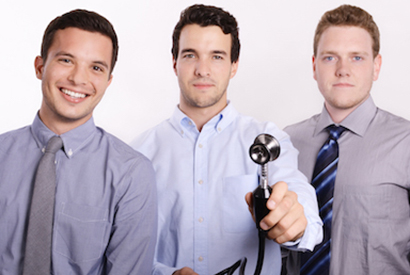$2 million funding boost for SkyDeck-backed digital stethoscope device
A digital stethoscope enhancement that got its start at UC Berkeley and was nurtured under the wing of Skydeck, the university’s startup accelerator, received a big boost — $2 million — in new funding and will start clinical trials, Eko Devices, its developers, announced this week. The Eko Core attaches to an analog stethoscope to digitize heart sounds with the goal of improving cardiac diagnosis.

March 13, 2015
A digital stethoscope enhancement that got its start at UC Berkeley and was nurtured under the wing of Skydeck, the university’s startup accelerator, received a big boost — $2 million — in new funding, Eko Devices, its developers, announced this week.
The Eko Core, which attaches to an analog stethoscope to digitize heart sounds with the goal of greatly improving cardiac diagnosis, also will begin clinical trials at UC San Francisco, the company said.

Eko Devices co-founders Jason Bellet, Connor Landgraf and Tyler Crouch
The Eko Devices team — one of six SkyDeck startups recently recognized in Forbes magazine’s “30 Under 30” feature — came together at Berkeley. Co-founders Connor Landgraf, Tyler Crouch and Jason Bellet got to know each other when Landgraf was working on his master’s in mechanical engineering. Crouch was a mechanical engineering undergraduate at the same time, and Belley was in the undergraduate business administration program at Berkeley’s Haas School of Business.
The idea for what became the Eko Core came to Landgraf in a course he was taking from Amy Herr, a professor of bioengineering whose leads the Herr Lab in Bioinstrumentation for Quantitative Biology and Medicine.
“During Amy Herr’s design course, Connor had the opportunity to connect with clinicians and better understand clinical pain points that were due to a lack of — or underperforming — technology,” says Bellet. “One specific pain point was the difficulty hearing and diagnosing heart conditions using an analog stethoscope.”
“Connor set out to apply state-of-the-art technology to one of medicine’s oldest tools to help address that problem,” Bellet adds.
Eko Core is the result. It attaches to a regular stethoscope and improves the the heart sounds physicians hear. Its creators believe it has the potential to greatly improve the accuracy of diagnosing heart problems. One study cited by Eko Devices says that 75 percent of internal medicine residents misdiagnosed heart events with a regular stethoscope.
“SkyDeck was instrumental in helping Eko get off the ground,” says Bellet.The team moved into SkyDeck in fall 2013, and connected with funders and health care “influencers,” he explained.
In an interview with Forbes magazine, Landgraf added: “We spent a year at SkyDeck. We met investors and we got fantastic mentoring from the staff, particularly in the regulatory and financing fields. We also found that the cross-pollination that occurs between teams and advisors is incredibly valuable. When you leave, you stay in contact with the people you met.” The team now has its own offices in Berkeley.
More details about the new funding and clinical testing can be found in the Forbes article.